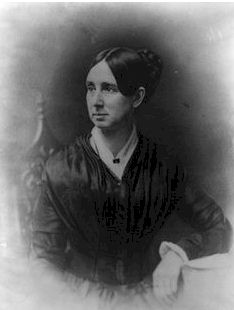|
 |

Part of the American
History & Genealogy Project |
Dorothea Lynde Dix 1805 ~ 1887


Dorothea Lynde Dix
In all past ages the weak, the lame, the
blind and the insane were supposed to be beyond cure or even
help. Only within recent years have the strong strived to help
the condition of those they often pitied but more often
despised.
The insane particularly were often
judged as under the control of Satan, and any effort to lessen
their sufferings or to improve their condition seemed the same
as helping the evil one. In 1730 the first asylum for the humane
treatment of these unfortunates was established in England, and
in 1750 Benjamin Franklin and others in the New World added a
department for demented people in the Pennsylvania Hospital. But
little was done for the benefit of the insane, either in this
country or m Europe until Dorothea Dix with strong and
unyielding purpose began her heroic work in their behalf. She
was eminently fitted for the work because she herself had seen
only the hard side of life. Her home with her grandparents in
Boston was a gloomy, joyless one, and she herself said later in
life, "I never knew childhood." Yet, the very hardness of this
experience fitted her for her life work. After years of
teaching, her mind was opened to the neglect and suffering of
weak-minded and insane. It is hard to believe the shocking
conditions which existed at that day in the treatment of the
insane, the patients being confined in cells with no floor but
the earth, no windows, consequently no ventilation. The straw on
which they slept was changed once a week, at which time the
occupants were given their only exercise. Such were the
conditions Miss Dix found when she visited the prisons,
hospitals and retreats in every state this side of the Rocky
Mountains. As she gazed at the appalling sight of human beings
in cages, closets and cellars, many of them naked, most of them
chained, and all of them thrashed into obedience, she realized
that a radical and immediate change was necessary.
In Providence at last was found a small
asylum that gave its patients wise and kind treatment, but it
was much overcrowded, and Miss Dix at once resolved to gather
the means for enlargement and make the institution an object
lesson. She went to the richest man in the city, who was also
notoriously close-fisted, and to him she related with her
wonderful power of feeling and eloquence the pathos and tragedy
of the condition of these benighted souls. To the surprise of
everyone the wealthy man listened spellbound, and at length
exclaimed: "Miss Dix, what do you want me to do?" "Sir, I want
you to give $50,000 toward the enlargement of the insane
hospital in your city," replied Miss Dix. "Madame, I will do
it," said the rich man, with perhaps the first desire of his
life to help suffering humanity, inspired by this young woman.
This was the beginning which has changed the whole conditions of
the institutions of our country, and started work along the
right line for the insane and criminals.
In the Civil War Dorothea Dix offered her services to the
Secretary of War as a nurse, and under her direction much was
done to improve the hospitals and so relieve the suffering of
those sick and wounded. At length, when four-score years old,
well worn out with her work, she was invited to make her home in
the asylum in Trenton, N. J., one of the many institutions
founded by her. Here she was visited by a multitude of friends,
while a continual flow of letters from all over the country
brought to her the grateful expressions of the many she had
aided.
She died July 19, 1887, and one of the
many prominent men who passed judgment on her work at this time
said, "Thus has died and been laid at rest in the most quiet and
unostentatious way the most useful and distinguished woman
America has yet produced."
Women of
America

Source: The Part Taken by Women in
American History, By Mrs. John A. Logan, Published by The Perry-Nalle
Publishing Company, Wilmington, Delaware, 1912.
|